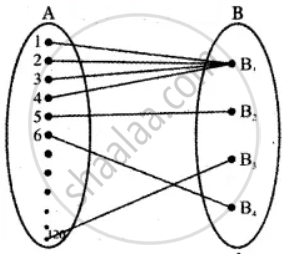Advertisements
Advertisements
प्रश्न
Suppose that 120 students are studying in 4 sections of eleventh standard in a school. Let A denote the set of students and B denote the set of the sections. Define a relation from A to B as “x related to y if the student x belongs to the section y”. Is this relation a function? What can you say about the inverse relation? Explain your answer
उत्तर
Given: A denotes the set of students and B denotes the set of sections.
Also given there 120 students and 4 sections.
Let f be a relation from A to B as “x related to y if the student x belongs to the section y”
Two are more students in A may belong to same section in B.
But one student in A cannot belong to two or more sections in B.
Every student in A can belong to any one of the section in B.
Therefore / is a function.
In B we can have sections without students.
Every element in B need not have preimage in A.
∴ f need not be onto.
Thus, f is a function and inverse relation for f need not exist.
APPEARS IN
संबंधित प्रश्न
Write the values of f at −3, 5, 2, −1, 0 if
f(x) = `{{:(x^2 + x - 5, "if" x ∈ (−∞, 0)),(x^2 + 3x - 2, "if" x ∈ (3, ∞)),(x^2, "if" x ∈ (0",", 2)),(x^2 - 3, "otherwise"):}`
State whether the following relations are functions or not. If it is a function check for one-to-oneness and ontoness. If it is not a function, state why?
If A = {a, b, c} and f = {(a, c), (b, c), (c, b)}; (f : A → A)
State whether the following relations are functions or not. If it is a function check for one-to-oneness and ontoness. If it is not a function, state why?
If X = {x, y, z} and f = {(x, y), (x, z), (z, x)}; (f : X → X)
Let A = {1, 2, 3, 4} and B = {a, b, c, d}. Give a function from A → B of the following:
neither one-to-one nor onto
Let A = {1, 2, 3, 4} and B = {a, b, c, d}. Give a function from A → B of the following:
not one-to-one but onto
Find the largest possible domain of the real valued function f(x) = `sqrt(4 - x^2)/sqrt(x^2 - 9)`
If f, g : R → R are defined by f(x) = |x| + x and g(x) = |x| – x find g o f and f o g
If f, g, h are real valued functions defined on R, then prove that (f + g) o h = f o h + g o h. What can you say about f o (g + h)? Justify your answer
If f : R → R is defined by f(x) = 3x − 5, prove that f is a bijection and find its inverse
The owner of a small restaurant can prepare a particular meal at a cost of Rupees 100. He estimates that if the menu price of the meal is x rupees, then the number of customers who will order that meal at that price in an evening is given by the function D(x) = 200 − x. Express his day revenue, total cost and profit on this meal as functions of x
The formula for converting from Fahrenheit to Celsius temperatures is y = `(5x)/9 - 160/9`. Find the inverse of this function and determine whether the inverse is also a function
Choose the correct alternative:
If f(x) = |x − 2| + |x + 2|, x ∈ R, then
Choose the correct alternative:
The range of the function `1/(1 - 2 sin x)` is
Choose the correct alternative:
The range of the function f(x) = |[x] − x|, x ∈ R is
Choose the correct alternative:
The function f : [0, 2π] → [−1, 1] defined by f(x) = sin x is
Choose the correct alternative:
Let X = {1, 2, 3, 4}, Y = {a, b, c, d} and f = {(1, a), (4, b), (2, c), (3, d), (2, d)}. Then f is
Choose the correct alternative:
The inverse of f(x) = `{{:(x, "if" x < 1),(x^2, "if" 1 ≤ x ≤ 4),(8sqrt(x), "if" x > 4):}` is
